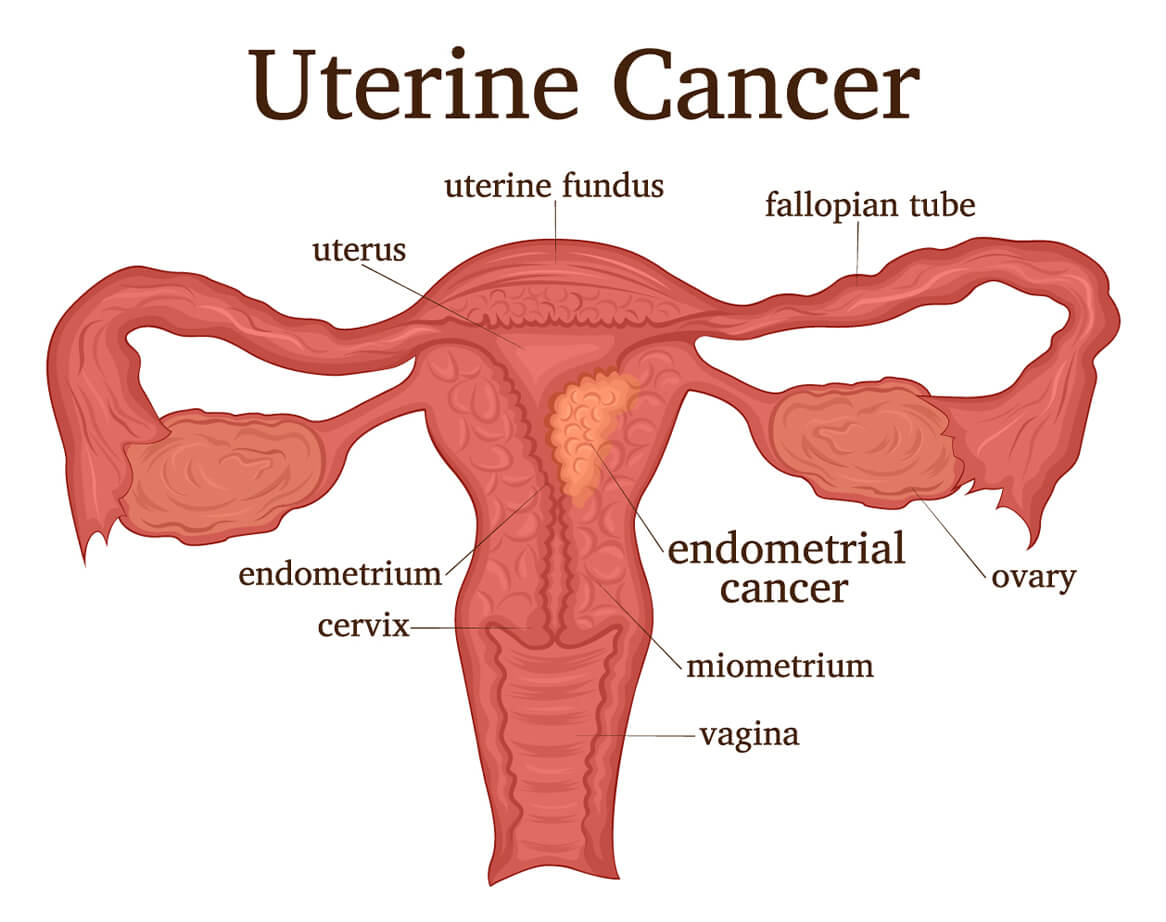Uterine Cancer Treatment in South Florida
Uterine Cancer is the most common gynecological cancer and most often develops after menopause. A common subtype is Endometrial Cancer, which develops when abnormal malignant cells grow from the endometrium (the inner lining of the uterus), but can also originate from the muscle and connective tissue. There are many different types of endometrial cancer; the most common type is endometrioid adenocarcinoma, which has a high cure rate because it is usually detected early.
What are the symptoms of uterine cancer?
Here are the most common symptoms of uterine cancer:
- Abnormal vaginal bleeding or discharge
- Heavy bleeding between periods
- Difficulty or painful urination
- Pain during sexual intercourse
- Pelvic pain
- Unintentional weight loss

How is uterine cancer diagnosed?
Uterine cancer is diagnosed usually with a pelvic exam, Pap test, ultrasound, and biopsy. At times, a hysteroscopy, x-ray, CT scan, PET scan, or MRI may be done to help confirm the diagnosis of the cancer and determine the best treatment.
A physical and pelvic exam is usually the first step in diagnosing uterine cancer. Based on the results of the exam, your physician may recommend a pelvic or transvaginal ultrasound to get a better look at the ovaries, fallopian tubes, and uterus. The ultrasound is also helpful in detecting endometrial polyps, measuring the thickness of the endometrium, and assisting your doctor in determining which tissue is optimum for the biopsy.
A hysteroscopy might also be performed for closer examination of the uterus. Your doctor will insert a scope into your uterus and visualize the endometrium and uterus lining. If cancer is suspected, tissue will be removed from the uterine lining for biopsy. If the biopsy is inconclusive, a dilation and curettage (D&C) may be performed to scrape tissue from the uterine lining and send it to the lab for testing.

How is uterine cancer treated?
Your treatment plan is a personalized one, based on your age, overall health, as well as the type, location, grade, and stage of the tumor. Uterine cancers are staged from I to IV, with Stage I cancer being the most localized and Stage IV indicating metastasis to distant organs. The grade indicates whether the cells resemble healthy tissue (low-grade tumor) or unhealthy tissue (high-grade tumor).
Surgery is the most common treatment for uterine cancer. The type of surgery performed takes into account the stage and grade of the tumor as well as your family planning needs.
In many cases, uterine cancer can be treated with minimally invasive techniques such as laparoscopic or robotic surgery. Our goal is to remove the tumor, as well as any lymph nodes, organs, or tissues which may be affected by cancer. Most times, a hysterectomy, which involves the removal of the uterus and cervix, may be required – along with the ovaries, tubes, and lymph glands.
Following surgery, your physician may recommend radiation or chemotherapy to eradicate any remaining cancer cells. The advantage for patients being managed by a gynecologic oncologist is that because of subspecialized training, they can not only surgically remove the tumor, but also coordinate and administer chemotherapy treatment. The Center for Gynecologic Oncology offers a chemotherapeutic suite supervised by a chemotherapy nurse with more than 18 years of experience.
If you have advanced-stage uterine cancer, options may include radiation therapy to manage pain or hormone therapy to inhibit cancer cell growth. These treatments have been found to significantly improve your quality of life.
What are the risk factors for uterine cancer?
The risk factors for uterine cancer include obesity, diabetes, genetics, a previous diagnosis of breast or ovarian cancer, unopposed estrogen (HRT), and polycystic ovarian syndrome (PCOS).
Research has indicated that certain factors can lower your risk of uterine cancer, including maintaining a healthy weight, taking birth control pills or using an intrauterine device (IUD), regulating the menstrual cycle, and reducing inflammation associated with an increased risk for cancer.
Though not totally preventable, uterine cancer is both common and curable.
At the Center for Gynecologic Oncology, we have seen firsthand the role early detection plays in curing many types of uterine cancer. The five-year survival rate of women with uterine cancer caught in the early stages is 90-95%. As gynecologist oncologists, we are dedicated to providing you with the most up-to-date treatments and the best possible outcome.


